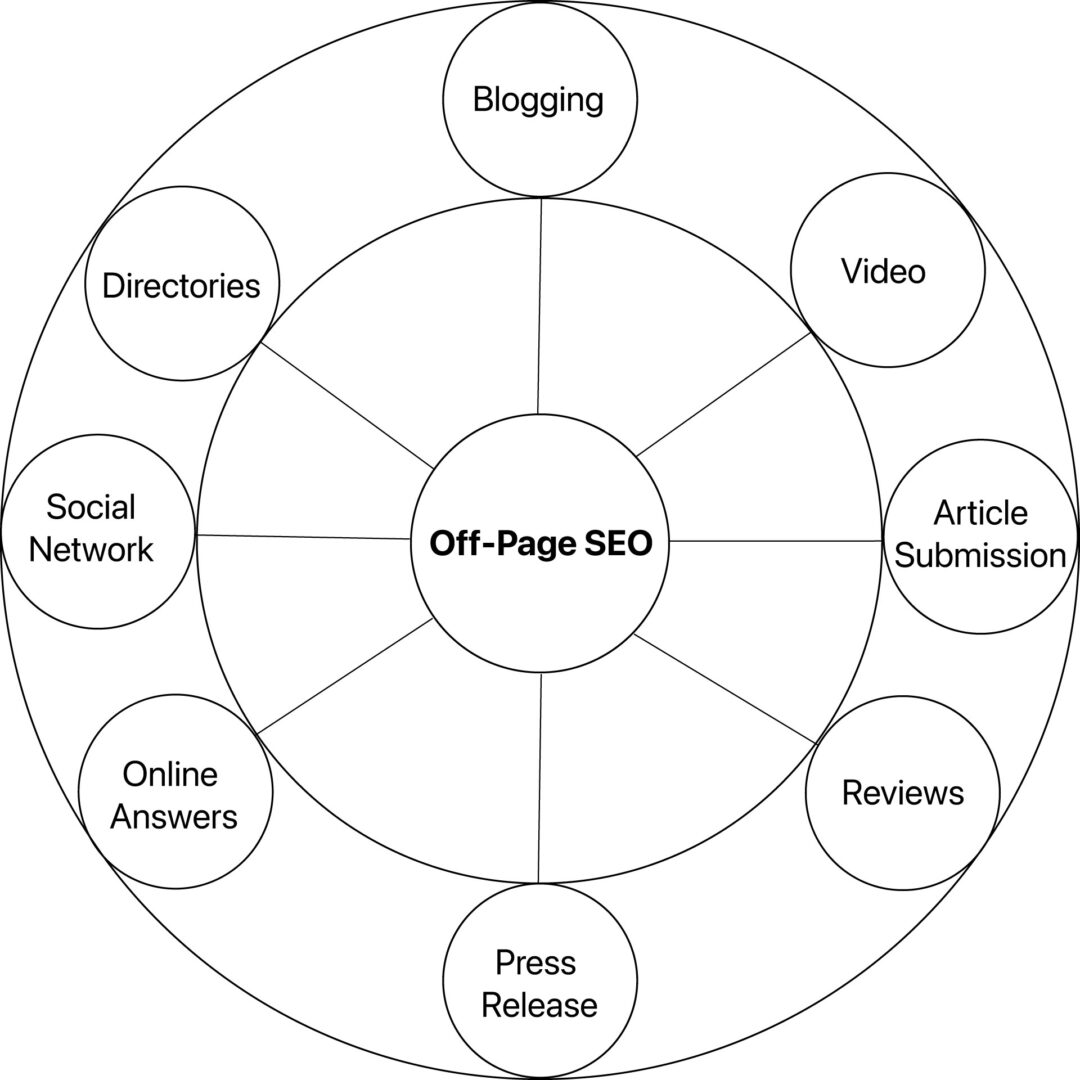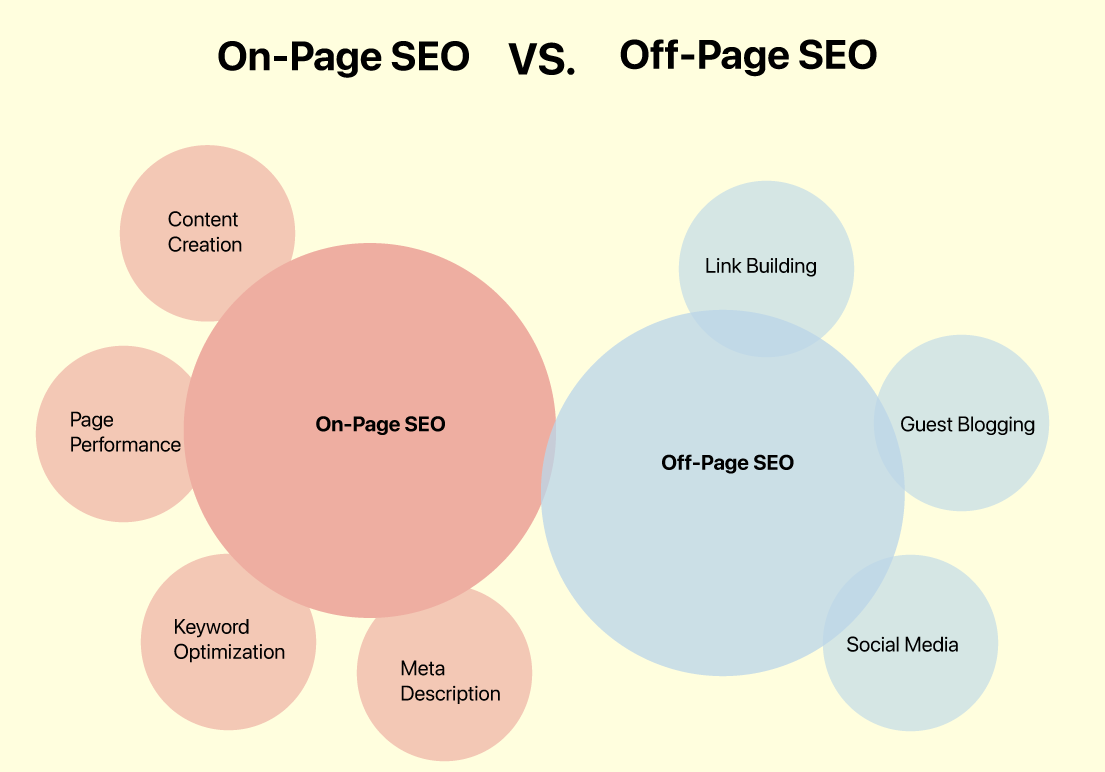What is Off-page SEO
Off-page SEO focuses on actions taken outside the website to improve its search engine rankings, such as link building, online reviews, brand mentions and citations and social media marketing.
Elevating Digital Influence Beyond Borders
In the ever-expansive realm of the internet, Off-Page SEO emerges as the conductor of digital authority, orchestrating strategies that transcend the boundaries of a website. Join us on an insightful journey into the world of Off-Page SEO, uncovering its process overview, sample use cases, and real-world case studies that underscore its transformative role in shaping online prominence and building credible digital footprints.
Process Overview: Nurturing the Digital Ecosystem
Objective: Off-Page SEO is a set of strategies and activities that aim to enhance a website’s authority, relevance, and trustworthiness through actions taken outside the website itself. The primary objective is to build a robust online presence by establishing credibility, attracting quality backlinks, and fostering positive interactions across the digital landscape.
Key Stages
Link Building:
Strategically acquire high-quality backlinks from reputable and relevant websites.
Focus on natural link-building tactics, such as guest blogging, influencer outreach, and content partnerships.
Social Media Presence:
Cultivate a strong presence on social media platforms relevant to the target audience.
Share valuable content, engage with followers, and foster a community around the brand.
Brand Mentions:
Encourage and monitor brand mentions across the web.
Leverage tools to identify unlinked brand mentions and reach out to encourage link inclusion.
Influencer Collaborations:
Collaborate with influencers and industry thought leaders to amplify brand reach.
Engage in influencer marketing activities, such as sponsored content and collaborations.
Create and distribute high-quality, shareable content that naturally attracts links.
Utilize content marketing channels, such as guest posting, to reach new audiences.
Online Reviews and Testimonials:
Actively seek and manage online reviews and testimonials.
Encourage satisfied customers to leave positive reviews on review platforms and engage with feedback.
Key Components
Backlink Quality:
Prioritize the acquisition of high-quality, authoritative backlinks.
Avoid spammy or low-quality link-building practices that may harm the website’s reputation.
Diverse Anchor Texts:
Use diverse anchor texts in backlinks to maintain a natural and organic link profile.
Avoid over-optimized anchor texts that may raise red flags with search engines.
Social Signals:
Cultivate a strong presence on social media platforms.
Generate social signals through shares, likes, and comments to indicate content relevance and engagement.
Influencer Authority:
Collaborate with influencers and industry experts with genuine authority.
Seek influencers whose expertise aligns with the brand’s values and offerings.
Brand Reputation Management:
Monitor and manage online brand mentions.
Respond promptly to both positive and negative mentions to maintain a positive brand image.
Sample Use Cases: Building Digital Authority with Finesse
Link Building Campaign for an E-commerce Site:
- Objective: Enhance the online visibility of an e-commerce site.
- Off-Page SEO Focus: Implement a strategic link-building campaign, reaching out to industry-related blogs for guest post opportunities and collaborating with influencers for product reviews.
- Outcome: The e-commerce site gains authoritative backlinks, improving its search engine rankings and attracting a broader audience.
Social Media Engagement for a Tech Startup:
- Objective: Establish a strong online presence for a tech startup.
- Off-Page SEO Focus: Actively engage with the target audience on social media platforms, share insightful content, and participate in industry conversations.
- Outcome: The tech startup builds a dedicated social media following, increases brand awareness, and creates a community around its products.
Influencer Collaboration for a Fitness Brand:
- Objective: Amplify the reach of a fitness brand.
- Off-Page SEO Focus: Collaborate with fitness influencers to create and share workout videos, healthy recipes, and product endorsements.
- Outcome: The fitness brand gains exposure to a wider audience, establishes credibility, and sees an increase in online sales.
Content Marketing for a Travel Blog:
- Objective: Boost the readership of a travel blog.
- Off-Page SEO Focus: Publish high-quality travel articles and guest posts on reputable travel websites, attracting natural backlinks.
- Outcome: The travel blog becomes a go-to resource, ranking higher in search results and expanding its readership.
Case Studies: Off-Page SEO Success Stories
Airbnb’s Community Building:
- Challenge: Airbnb aimed to build a global community of hosts and travelers.
- Off-Page SEO Implementation: Fostered community engagement through social media platforms, influencer collaborations, and user-generated content.
- Outcome: Airbnb became synonymous with community-driven travel experiences, leveraging off-page strategies to build a trusted brand.
Nike’s Influencer Marketing:
- Challenge: Nike sought to solidify its position as a leading sportswear brand.
- Off-Page SEO Implementation: Collaborated with top athletes and influencers to showcase Nike products in action.
- Outcome: Nike’s influencer partnerships elevated its brand visibility, connecting with a diverse and engaged audience.
TripAdvisor’s Review Ecosystem:
- Challenge: TripAdvisor aimed to become the go-to platform for travel reviews.
- Off-Page SEO Implementation: Encouraged users to leave reviews, engaged with influencers in the travel industry, and built partnerships with travel bloggers.
- Outcome: TripAdvisor became a trusted source of travel recommendations, harnessing the power of off-page strategies.
Maximizing the Impact of Off-Page SEO
To ensure the optimal impact of Off-Page SEO, organizations should address common challenges:
Quality Over Quantity:
Prioritize the quality of backlinks and collaborations over quantity.
Avoid engaging in practices that may lead to spammy or low-quality links.
Consistent Brand Messaging:
Maintain a consistent brand message across different platforms.
Ensure that influencer collaborations align with the brand’s values and messaging.
Ethical Influencer Engagements:
Engage with influencers who align with ethical practices.
Be transparent in collaborations and disclose any sponsored content.
Monitoring Online Mentions:
Implement tools to monitor brand mentions and reviews.
Respond thoughtfully to both positive and negative feedback to manage brand reputation effectively.
Beyond the Horizon of Web Pages
Off-Page SEO stands as the navigator beyond the borders of web pages, steering digital authority and credibility across the vast seas of the internet. Through a comprehensive process overview, sample use cases, and real-world case studies, we’ve unveiled the transformative power of Off-Page SEO—from Airbnb’s community building to Nike’s influencer collaborations.
In the symphony of online strategies, Off-Page SEO is the orchestrator, weaving connections, and amplifying brand resonance beyond the confines of a website. As organizations strive for digital prominence, the mastery of Off-Page SEO becomes the compass, guiding them toward a horizon where authority, influence, and trust converge to shape a compelling online legacy.

Importance
Building Authority and Trust: Off-page SEO is instrumental in establishing your website’s authority and credibility in the eyes of search engines. When reputable websites link to your content, search engines interpret it as a vote of confidence, signifying that your content is valuable and trustworthy. This, in turn, positively impacts your website’s ranking and visibility.
Enhancing Search Engine Rankings: Search engines consider the number and quality of backlinks as a crucial factor in determining the relevance and authority of a website. A robust off-page SEO strategy that focuses on acquiring high-quality backlinks can significantly boost your website’s search engine rankings. This is essential for attracting organic traffic and staying ahead of your competitors.
Amplifying Online Visibility: Off-page SEO extends your online reach beyond the confines of your website. Through various channels such as social media, forums, and other online communities, you can amplify the visibility of your brand and content. This increased exposure not only attracts more visitors but also contributes to the overall awareness of your brand within your industry.
Strengthening Local Presence: For businesses with a local focus, off-page SEO plays a crucial role in local search rankings. Local citations, positive reviews, and engagement in local communities contribute to a strong local presence. This is particularly important for brick-and-mortar businesses seeking to attract customers in their geographical vicinity.

Your Business Benefits
High-Quality Backlinks: The cornerstone of off-page SEO is the acquisition of high-quality backlinks from authoritative and relevant websites. These backlinks serve as endorsements of your content, signaling to search engines that your website is a reliable source within your industry. The higher the quality of backlinks, the more positive the impact on your website’s authority.
Increased Website Traffic: A well-executed off-page SEO strategy can lead to increased referral traffic from other websites, social media platforms, and online communities. As more people discover and click on links pointing to your website, your overall traffic grows, contributing to improved visibility and potential customer acquisition.
Brand Exposure and Recognition: Engaging in off-page SEO activities such as social media marketing, influencer collaborations, and content sharing exposes your brand to a broader audience. Consistent and positive exposure fosters brand recognition, making it more likely for users to choose your brand when seeking products, services, or information in your niche.
Enhanced Trust and Credibility: Backlinks from reputable sources, positive reviews, and mentions in influential online spaces contribute to the overall trustworthiness of your website. As users encounter your brand across various platforms and see endorsements from trusted sources, their confidence in your brand grows, leading to increased trust and credibility.
Diversification of Traffic Sources: Relying solely on on-page SEO may limit your website’s exposure. Off-page SEO diversifies your traffic sources by tapping into external platforms and communities. This not only reduces dependence on search engine traffic but also creates a more resilient and sustainable web presence.
Your Business Strategies
Link Building Strategies: Implementing effective link building strategies is at the core of off-page SEO. This includes outreach to relevant websites for guest posting opportunities, creating link-worthy content, and engaging in partnerships within your industry to secure high-quality backlinks.
Social Media Engagement: Actively participating in social media platforms is crucial for off-page SEO. Share your content, engage with your audience, and participate in industry discussions. Social signals, such as likes, shares, and comments, contribute to your website’s authority.
Influencer Collaborations: Partnering with influencers in your industry can provide your brand with exposure to a wider audience. Influencers can endorse your products or services, share your content, and contribute to the generation of valuable backlinks.
Content Marketing and Viral Campaigns: Develop shareable and engaging content that has the potential to go viral. Viral campaigns can attract a massive audience, generate social media buzz, and result in organic backlinks from various sources.
Online Reviews and Reputation Management: Encourage satisfied customers to leave positive reviews on platforms like Google My Business, Yelp, and industry-specific review sites. Managing your online reputation ensures a positive perception of your brand.
Local SEO Optimization: For businesses targeting local audiences, optimizing for local SEO is essential. This involves creating and maintaining a Google My Business profile, obtaining local citations, and engaging with local communities.
Forum Participation and Community Building: Engage in relevant forums and online communities within your industry. Provide valuable insights, answer questions, and include links to your website when relevant. Building a positive presence in these communities can lead to natural backlinks.
Content Syndication: Syndicate your content on reputable platforms to reach a broader audience. This can include republishing articles on platforms like Medium or submitting infographics to relevant websites for wider distribution.
Continuous Monitoring and Analysis: Regularly monitor your off-page SEO efforts using analytics tools. Track backlinks, social signals, and other metrics to assess the impact of your strategies. Adjust your approach based on the performance of different activities.
Adherence to Best Practices: Stay informed about industry best practices and adhere to ethical and sustainable off-page SEO strategies. Avoid engaging in practices that could result in penalties from search engines, such as buying low-quality backlinks or participating in link schemes.

